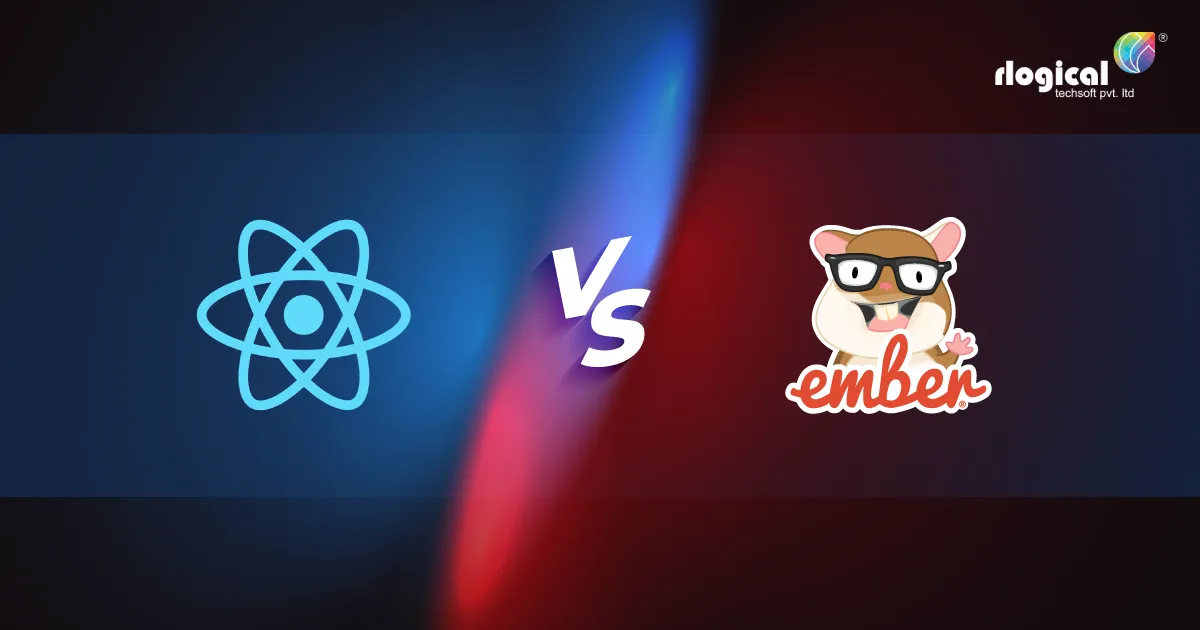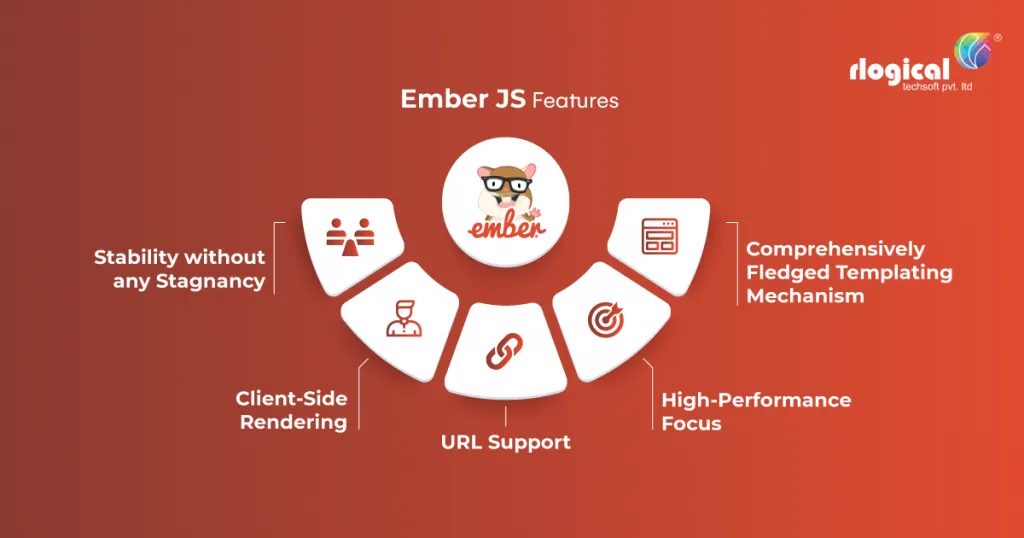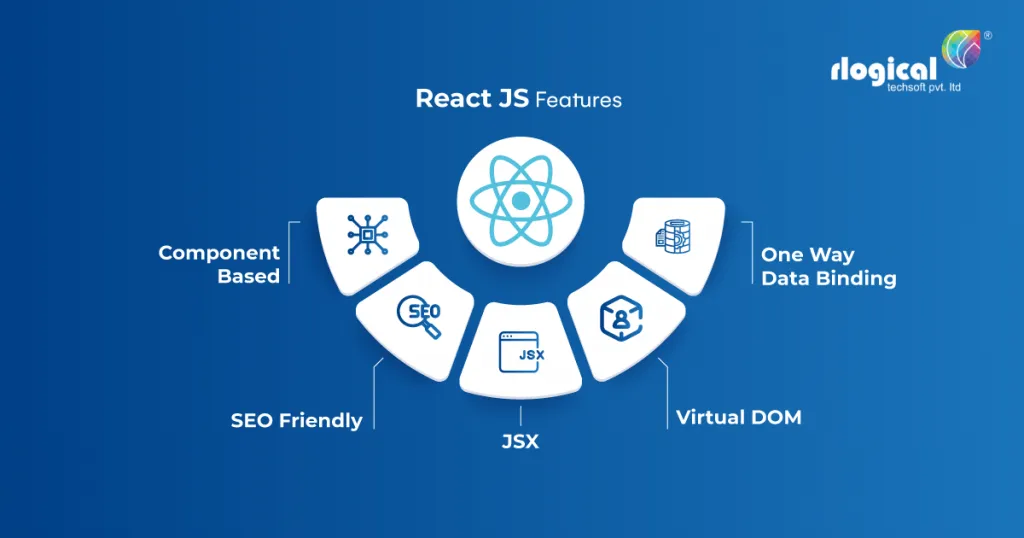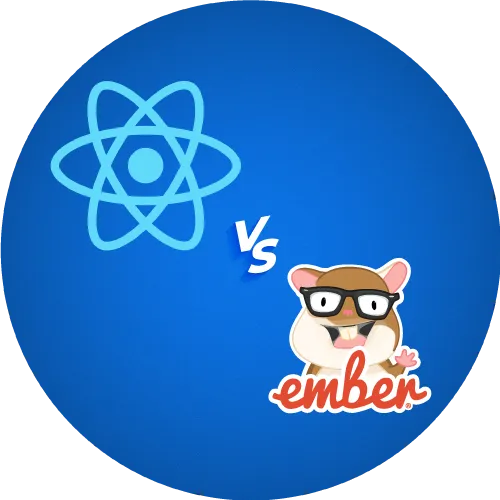
What exactly is EmberJS?
EmberJs is an open-source JavaScript framework that Yehuda Katz created. The main purpose of Ember JS is to create web apps. It allows creating client-side JavaScript apps by providing comprehensive management consisting of data management. The initial name of Ember JS happened to be SproutCore MVC framework. It features a 2-way binding as well as server-side rendering design.
Ember JS Features:

- Client-side rendering
- Stability without any stagnancy
- Comprehensively fledged templating mechanism
- High-performance focus
- URL support
What exactly is React JS?
It is an open-source JavaScript library created by Facebook and is used for managing the view layer for mobile and web applications. It is possible to present it on the server-side as well as the client-side. React JS helps simplify the process of mobile application development since the code that has been written at the time of website development can be used once again for creating a mobile app. React JS is ideal for continuing large amounts of information.
React JS Features:

- Component-based
- JSX
- SEO friendly
- Virtual DOM
Both Ember JS as well as React JS happen to be well-known choices in the market at present. In the subsequent paragraphs, we will talk about some major differences between the 2. But before that, we will talk about their pros and cons.
React JS pros
- It comes with an XML-life syntax extension that makes it very simple and fast to write codes
- It happens to be SEO-friendly. Search engines can index these types of web application pages very quickly.
- Appropriate for applications that depend on the big data concept.
- It can boast of having Virtual DOM that helps to improve the high-load application performance significantly.
- Code components can be reused according to requirements.
-
Applications developed using React JS will be rendering faster since it helps to create isomorphic code. There is no need to duplicate the identical features since the same code is employed for servers and client bases. As a result, the app rendering time happens to be quicker. This aids in reducing the overall time and cost of development.
React JS cons
-
Even though React framework is concerned about saving time and offering the most effective code for web apps, on some occasions, extensive coding was needed by React. This implied more work and more time to be invested by the developers.
-
The ReactJS Developer community is developing gradually. Nevertheless, it is somewhat tough to comprehend the training as well as documentation collateral of the framework. Moreover, lots of time is taken by the documentation to become updated.
- React JS is not supported by certain browsers, which can cause a problem for the programmers who will be required to make use of additional extensions and plugins.
Must Read: Best 9 Examples of Websites Built with ReactJs
Ember JS pros
- Long-term support, as well as maintenance, is provided by Ember JS Developers for the created project.
- It comes with server-side rendering only with URL support features and data binding.
- It can boast of having a rich architecture with advanced tools and control system for swapping to freshly updated versions.
- Ember’s documentation happens to be clear and concise, and it also offers information on various tools for avoiding outdated APIs.
Ember JS cons
- Even though the rendering might be slow initially, it will pick up in the long run.
- As compared to the community of React, Ember’s Developer Community is not that large. Moreover, it comes with fewer libraries and code examples.
- On some occasions, the programmer might find it tough to find a solution since there might not be sufficient documentation aid available to them. This can result in complexity while creating a web app.
Comparison Table Between Ember JS vs. React JS
EmberJs |
ReactJS |
| Open-Source JavaScript framework | Open-Source JavaScript Library |
| Created by Yehuda Katz | Created by Facebook |
| Creating Web Apps | Creating Mobile and Web Applications |
| Present client-side JavaScript apps | Present on the server-side as well as the client-side |
| Two Way Data Binding | One Way Data Binding |
| Fast, comprehensive, and Flexible | High performance & productive |
Ember JS vs. React JS – Community
How big is the React JS community?
React is quite popular amongst numerous developers right now, and lots of tech giants praise its simplicity. Apart from 1000s of Stack Overflow queries, React boasts well-known discussion-community forums like Spectrum’s React community, Hashnode’s React community, and Reddit’s React community. There are more than 160k Github stars which make the community of React quite remarkable at present. It also becomes quite easy for a newbie to solve problems by fitting in a community.
How big is the Ember JS community?
Ember is quite well-known amongst software developers and tech companies due to its stable community and robust foundation. It can boast of having more than 20k Github stars which have secured its position out there. Despite this, it is not as popular as React amongst the developers. However, there is no doubt about the fact that the community is mature, active, as well as useful.
Must Read: Ember JS with its Pros and Cons
Ember JS vs. React JS – Learning curve
How effective is React’s learning curve for the developers?
The platform happens to be pure Javascript. It can be picked by anybody proficient as well as experienced in Javascript. Moreover, it does not take much time to learn if the programmer is savvy with API structures and data flow. The community also welcomes newbies having a basic comprehension of JavaScript.
How effective is Ember’s learning curve for the developers?
It is a fact that convention is preferred by Ember rather than development rules, more standard practices, and configuration. Naturally, the learning curve is rather steep, and one has to learn conventional methods and keep a standard practice all through the app. Furthermore, a solid effort will be needed for becoming involved with a large ecosystem.
Ember JS vs. React JS – Performance comparison
How React JS stands out when it comes to performance?
Given that it is a view library React happens to be a comprehensive package providing remarkable performance. The platform is quite lightweight, which provides a fantastic performance by complementing several elements within an application or program. Nevertheless, programmers are not very fond of it at present. React has hit the benchmark thanks to its component-based workflow, leaner architecture, rendering of JavaScript pages, and reusing of components.
How Ember JS stands out when it comes to performance?
No one can deny the fact that this framework is simply huge. It emphasizes creating large-scale and more prominent applications, which makes its performance metrics a bit different. The framework will not become exhausted while solving an excessive number of issues and handling complicated functionalities.
It will lag behind the more lightweight frameworks such as React if you like it to initially render pages. However, more upgrades are expected shortly, and it appears that the framework will be able to render webpages effectively.
Ember JS vs. React JS – Suitability for complicated applications
Is React ideal for creating complicated apps?
React happens to be a library supporting both server-side rendering architecture as well as SPA. Consequently, it can boast of having the building blocks for constructing complicated applications.
Therefore, if you think it is difficult to manage multiple different modules, there is no need to worry. React is appropriate for building complicated applications. However, when we compare it with Ember, it is Ember who will be a clear winner mainly because of its MVC advantages and library-like capacities.
Is it possible to build complicated applications using Ember JS?
Ember JS can manage the data as well as server-side interactions successfully. On the other hand, React will be needing assistance from an external platform or architecture. It is usually a case of large and complicated applications requiring the management of the front-end as a whole. In this type of situation, Ember JS proves to be an excellent front-end framework. Nevertheless, it should be mentioned that Ember might lack the various ways of the component organization compared to React.
That being said, selecting Ember JS for enterprise-grade applications brings several other important features such as conventional technique, adequate inbuilt elements, architectural pattern, and so on, which help to append business value and quality to the software product.
Must Read: Top 7 Reasons for Choose UX Design for Business
Ember JS vs. React JS – User Experience (UX)
The ability of React to provide the best user experience
React can boast of having excellent exposure to designs that are developer-oriented. The community of React works continuously to make it an outstanding platform providing seamless user experiences. React aligns the development principles and design principles for a simplified user experience. This consists of being careful not to bloat the applications with unnecessary code referred to as common abstraction. All these aspects help make React an excellent framework that can deal with different use cases and offer a remarkable experience for every application out there.
How does Ember help to provide the best user experience?
Ember is equipped with different tools for providing the desired UX. It will be possible for you to create a pre-testable UI with Ember CLI plus add-ons. All these tools help to create as well as test apps by functioning as APIs and mock servers. Ember CLI helps in adding extra features which are not provided by the framework by default. This particular feature likewise helps to generate components for adding more UI elements that can be reused.
These components react accordingly after viewing the user interface behavior. Ember has been designed mainly for the developers and features a product-based architecture and proactive features for the user. Because of this, Ember can provide the preferred UX in large applications. For this reason, lots of big companies, including Microsoft and Amazon, make use of this framework for their projects at present.
Conclusion
Although you might be excited about selecting the most effective front-end framework, it will not be difficult to choose between React and Ember. And in case you find it difficult, it is figuring out the application type that will be required by you taking into consideration the choice of users plus their experience with the application.
Jatin Panchal
Jatin Panchal is the Founder & Managing Director at Rlogical Techsoft Pvt. Ltd. For more than a decade, he has been fostering the organization's growth in the IT horizons. He has always bestowed personalized approaches on .NET, PHP, Flutter, and Full-Stack web development projects. From startups to large enterprises, he has empowered them to accomplish business goals. By delivering successful industry-driven solutions, he is encouraging the capability of AI, ML, blockchain, and IoT into custom websites and hybrid mobile applications.
Related Blog
- A Guide on Progressive Web App with React: The Long-Term Solution for Business Growth
- Top JavaScript Frameworks For Your Web Applications Project
- Why Use VueJS? Most Popular Frontend Framework for Your Web Development
- Create Appealing Real-Time Applications with NodeJS: The JavaScript Edge for Apps
- Top Apps Built With Node.js: The Success Story of NodeJS
Categories
- All
- AI Development Services
- Amazon Web Services (AWS)
- ASP.Net Development
- Azure Web App
- Big Data Analytic
- Customize
- Digital Marketing
- Drupal Development
- E-commerce web development
- Education Mobile App Development
- Enterprise Application
- Event Management App Development
- Fintech
- Fitness App Development
- Food Delievery
- Front-End Development
- Grocery App Development
- Healthcare App Development
- Hire Dedicated Developers
- Hotel Booking App
- IT Industry
- JavaScript Development
- Mobile App Development
- On Demand App Development
- On Demand Healthcare App Development
- PHP Development
- POS Software Development
- Real Estate Mobile App Development
- Retail Business App Development
- Salesforce
- Social Media Development
- Software Development
- Technology
- Transportation App Development
- UI/UX Design
- Web Design
- Web Development
- Web Services
- Web/Data Scraping Services
- WordPress




 Jatin Panchal in JavaScript Development
Jatin Panchal in JavaScript Development 






